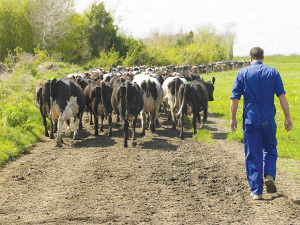Waikato dairy effluent breaches lead to $108,000 in fines
Two farmers and two farming companies were recently convicted and fined a total of $108,000 for environmental offending.
 Waikato Regional Council says planning is necessary when it comes to preventing pest plant spread and ensuring effluent doesn’t enter waterways.
Waikato Regional Council says planning is necessary when it comes to preventing pest plant spread and ensuring effluent doesn’t enter waterways.
Waikato Regional Council is reminding farmers to ensure machinery, vehicles and equipment are cleaned ahead of Moving Day.
The Council says planning is necessary when if comes to preventing pest plant spread and ensuring effluent doesn’t enter waterways.
“Through good on-farm biosecurity practices, farmers and contractors can make a massive difference to preventing the spread of pest plants and weeds,” says regional council biosecurity pest plants team leader, Darion Embling.
“Unclean machinery is a confirmed pathway for the spread of infestations, such as velvetleaf and alligator weed, between some farms in our region. That makes machinery hygiene especially important with Moving Day coming up and the mass movement of stock, machines and vehicles between farms.”
Embling says machinery hygiene must be practiced any time a machine is moved between properties.
“Any form of plant or soil contamination has a real potential for harbouring pests or weeds. Machinery should be cleaned so no visible soil or plant matter remains,” he says.
Ideally, machinery washdown should occur on the property prior to movement, containing any problems at the source. Alternatively, machinery can be cleaned in a built-for-purpose washdown facility, but care should be taken to ensure there is not a risk of pest spread during transport to that facility.
“Pest plants such as alligator weed and velvetleaf can have a massive impact on the productivity and profitability of farm businesses, so farmers and contractors need to be extra vigilant when moving between properties,” says Embling.
Farmers are also reminded to stand stock off green feed before they’re walked or transported to prevent effluent entering waterways and help keep the region’s roads clear of discharge and safe for users.
A cow’s daily combined effluent is approximately 52 litres, and a truck effluent tank’s capacity is just 200 litres. It means the spillage of effluent onto roads is a real risk unless farmers in particular take some simple steps ahead of time.
The regional council recommends that farmers:
use dry feed before transport because it results in less effluent.
Could a breakthrough in fermentation create a new multi-million-dollar export market for shiitake mushroom extracts into China?
Meadow Fresh has created the world's first fantasy sports league powered by real cows.
This year, 'Foodie February' sees potatoes take the spotlight as one of New Zealand's most powerful and versatile food heroes.
A multi-cultural team is helping to establish one of New Zealand's largest plantings of premium eating grapes - while learning each other's languages and cultures along the way.
The World Wide Sires National All Day Breeds Best Youth Camp Best All Rounder plaudit has become family affair, with 2026 Paramount Cup winner Holly Williams following in her sister Zara's footsteps.
DairyNZ is giving New Zealand farmers a unique opportunity to gain hands-on governance and leadership experience within the dairy sector.